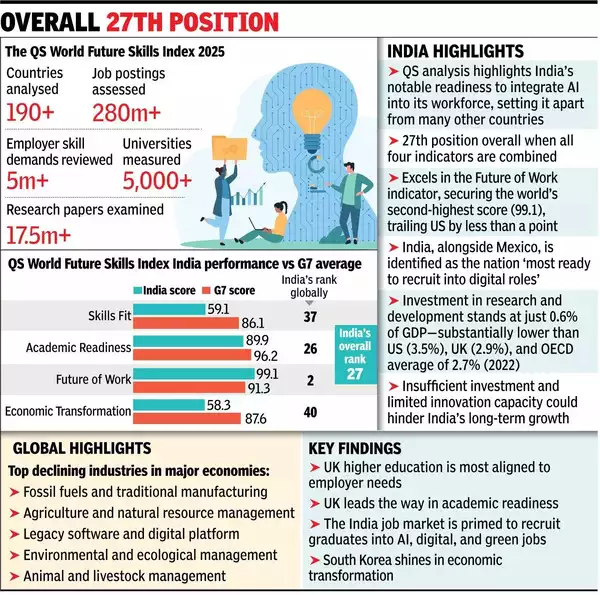
India’s skilling mission is yielding significant results, with the nation securing 27th place in the inaugural QS World Future Skills Index.
The index, which evaluates job market readiness for future skills, placed India second in the Future of Work category, trailing only the United States.
The rankings highlight India’s performance across key parameters:
- 37th in Skills Fit,
- 26th in Academic Readiness, and
- 40th in Economic Transformation
These achievements are attributed to India’s integration of AI, digital, and green technologies into its workforce, signaling strong adaptability in emerging fields.
Extensive QS Analysis
The QS analysis examined over 190 countries, analyzing 280 million job postings, more than five million employers’ skills demands, over 5,000 universities, and 17.5 million research papers.
India’s high rate of AI deployment – 59% among companies – reflects its position as a global leader in adopting cutting-edge technologies.
The World Economic Forum projects a 60% increase in AI skills and a 35% rise in digital skills in India by 2030, along with the creation of 24 million green jobs.
This growth underscores the need for adaptability and innovation in India’s job market, which aligns with the country’s 99.1 score in the Future of Work indicator.
“Despite global challenges, including a decline in venture capital (VC) funding, India remains the second-largest destination for VC in the Asia Pacific, reinforcing its robust investment ecosystem essential for innovation and future-ready job creation. The QS report also highlights the critical need for enhancements in India’s higher education system, particularly in equipping graduates with the skills most demanded by employers,” the report stated.

Recommendations For Higher Education Reforms
The QS report however emphasizes key reforms in India’s higher education system to meet employers’ skill demands:
- Increasing tertiary education supply,
- Modularizing higher education,
- Fostering entrepreneurial mindsets,
- Integrating green skills,
- Strengthening industry-academia collaboration, and
- Boosting research and development investments
Matteo Quacquarelli, Vice President of Strategy and Analytics at QS, asserted, “India’s exceptional GDP growth, developing economy, and youth population position it uniquely on the global stage. However, to sustain this growth, it is crucial to equip the workforce with relevant skills through comprehensive higher education reforms.”
The report further highlights that as AI transforms industries worldwide, India’s effort to align education with industry demands positions it as a leader in economic change.
With growth in sectors like renewable energy and healthcare, prioritizing emerging technologies and sustainability is crucial for India’s economic strength and workforce development.
Quacquarelli also noted that India’s economy will likely grow at an average annual rate of 6.5% between 2025 and 2030, surpassing many competing economies.
“But as the economy continues to evolve, students, graduates, and workers need support to keep pace with changing skill requirements. The 2020 National Education Policy emphasised creating an adult education curriculum framework, and it’s important India’s higher education is fully leveraged to develop future-needed skills and competencies,” he further added.
Also Read: India’s Smartphone Market Set To Cross $50 Billion; Exports To Reach $20 Billion In FY25
To read more such news, download Bharat Express news apps





















